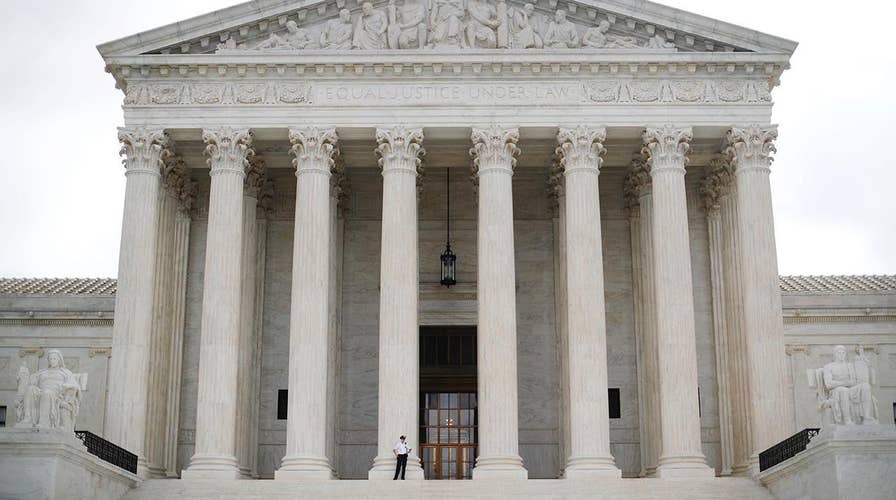Supreme Court allows Trump administration to start restricting transgender people in military
A Pentagon spokesperson says the Department of Defense's proposed policy is 'based on professional military judgment'; Lucas Tomlinson reports.
The U.S. Supreme Court on Tuesday allowed the Pentagon to restrict military service for transgender individuals while the Trump administration’s policy is litigated in the lower courts.
The ruling reversed the orders implemented by lower courts, which had prevented the Pentagon from proceeding with the plan. The issue brought a 5-4 conservative-liberal split, with Justices Ruth Bader Ginsburg, Stephen Breyer, Sonia Sotomayor, and Elena Kagan voting to keep the block on enforcement in place, while the five conservative justices, including Justice Brett Kavanaugh, voted to allow the policy to go into effect.
APPEALS COURT SIDES WITH TRUMP IN TRANSGENDER MILITARY CASE
The court's decision, though, does not apply to the policy's legality, or President Trump's authority to issue the ban. The decision was simply related to the policy's enforcement while the case continues to go through litigation at the lower courts.
The ruling came after the Justice Department requested that the Supreme Court bypass the lower courts and decide the issue—a request the high court rejected on Tuesday, instead directing the case to work its way through the appeals and lower courts.
Justice Department spokeswoman Kerri Kupec praised the Supreme Court's ruling in a statement Tuesday.
"We are pleased the Supreme Court granted stays in these cases, clearing the way for the policy to go into effect while litigation continues. The Department of Defense as the authority to create and implement personnel policies it has determined are necessary to defend our nation," Kupec said. "Due to lower courts issuing nationwide injunctions, our military had been forced to maintain a prior policy that poses a risk to military effectiveness and lethality for over a year."
But Democratic National Committee Chairman Tom Perez said the new policy goes "against our values as Americans" and "makes us less safe."
The Department of Defense had barred military service by transgender people until former President Barack Obama’s administration began to allow transgender people already in the military to serve openly. Former Defense Secretary Ash Carter suggested the services develop policies to allow people already identifying as transgender to newly join the military, and if they meet physical, medical and other standards, and have been stable in their identified genders for 18 months.
DOJ ASKS SUPREME COURT TO TAKE UP CASE OF MILITARY TRANSGENDER BAN
But in July 2017, early in his presidency, President Trump sought to restrict service to those who do not seek to undergo gender transitions -- after initially announcing a ban.
The announcement came in a series of tweets, citing advice from his "generals" and medical costs.
"Our military must be focused on decisive and overwhelming victory and cannot be burdened with the tremendous medical costs and disruption that transgender in the military would entail," Trump tweeted on July 26, 2017.
Prior to Trump's policy change, transgender troops had been able to receive medical care and start formally changing their gender identifications in the Pentagon's personnel system. Key concerns surrounding the Obama-era policy included whether currently enlisted troops have had medical or other issues that cause delays or problems with their ability to deploy or meet physical or other standards for their jobs.
Earlier this month, a federal appeals court sided with the Trump administration, ruling that it was wrong to block the Pentagon from implementing plans to block the service of transgender individuals. The appeals court ruling said the military's plan appears to rely on the "considered professional judgment" of "appropriate military officials." It noted that the plan "appears to permit some transgender individuals to serve in the military."
The Associated Press contributed to this report.





